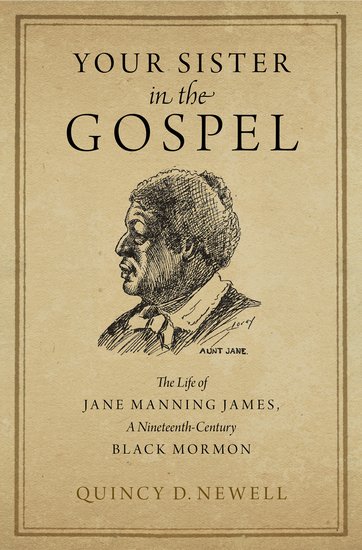
Quincy D. Newell’s new book Your Sister in the Gospel: The Life of Jane Manning James, A Nineteenth-Century Black Mormon is a unique and valuable addition to the fields of both Mormon Studies and nineteenth-century American History.
As Newell points out in her introduction, Jane Manning James’s story is “important because it troubles the waters” and “expands our understanding of nineteenth-century African American history beyond the standard narratives.”[1] That story is not as well-known as it should have been, and has been neglected by many scholars, perhaps, as Newell speculates, because Jane’s “membership in the LDS Church leads many scholars to see her as a dupe or a victim.”[2] Her narrative seems to move in a separate direction than many of the others. Instead of moving from “slavery to freedom”, Jane goes from being born free into a church that “treats her as a second-class citizen.”[3]
Using the documentary trail available, readers begin with Jane’s genealogy as a survivor, beginning from when her ancestors were first enslaved and brought over to America via the Middle Passage.[4] Because of gradual emancipation laws in her Connecticut birthplace, when she was born in about 1820, Jane Manning would be free, and she dwelt there until shortly after conversion to the Church of Jesus Christ of Latter-day Saints in 1842.
Her subsequent migration to Nauvoo would lead Jane Manning into the orbit of the prophet Joseph Smith and his wife Emma, and the short relationship that she formed with them would impact the rest of her life. Newell makes the point of noting that in Jane’s autobiography, the eight months that she spent working with Joseph and his family comprised nearly 40 percent of it.[5]
As with many events in Jane’s life, because of a paucity of records, Newell is forced to speculate on her thoughts and motivations. At first glance, these speculations could seem to predominantly lean towards the negative.[6] While potentially frustrating to some readers, they represent the full spectrum of possibilities and are true to the lived experience of many African Americans of that era.
In the appendix, Newell provides readers an incredibly valuable resource with the inclusion of five primary sources documents from Jane Manning James’s life. By permission of Jane’s descendants, the first two documents are her patriarchal blessings – given over fifty years apart by Hyrum Smith and John Smith respectively – which have never been publicly available before.[7] She also includes the three “most extensive narratives” of Jane’s life.
While it is surprising that this is the first biography of Jane Manning James to be published –especially with her increasing prominence over the past few decades – Quincy Newell has produced an extensively researched and highly readable biography,[8] one which it is hoped will lead to increased scholarly publications on this remarkable woman for years to come.
[1] Quincy D. Newell, Your Sister in the Gospel: The Life of Jane Manning James, A Nineteenth-Century Black Mormon (New York City: Oxford University Press, 2019), 2.
[2] Newell, Your Sister in the Gospel, 2.
[3] Newell, Your Sister in the Gospel, 2.
[4] Newell, Your Sister in the Gospel, 7.
[5] Newell, Your Sister in the Gospel, 124. As the author points out, the autobiography comprises approximately 2,800 words, and nearly 1,100 of them are focused on that time period.
[6] For examples, see the discussion about Mr. Fitch on pgs. 13-14, or the discussion about the American Civil War on pg. 83. Newell here does excellent work presenting possible scenarios and Jane’s potential thoughts regarding very difficult situations.
[7] Newell, Your Sister in the Gospel, 5.
[8] An unfortunate omission, in my opinion, that I noticed during my examination of the excellent bibliography, was the work of Russell W. Stevenson. While Newell and Stevenson differ in some of their interpretations, the reviewer recommends reading the work of both authors. See Russell W. Stevenson, For the Cause of Righteousness: A Global History of Blacks and Mormonism, 1830-2013 (Draper, UT: Greg Kofford Books, 2014).
 Jared Riddick is a graduate student at the University of North Texas, pursuing a Masters in Library Science. He previously graduated from Brigham Young University-Idaho with a Bachelor of Arts in History Education. He is currently the archivist for Book of Mormon Central, based in Springville, UT. His areas of academic interest include the Book of Mormon and the American Civil War.
Jared Riddick is a graduate student at the University of North Texas, pursuing a Masters in Library Science. He previously graduated from Brigham Young University-Idaho with a Bachelor of Arts in History Education. He is currently the archivist for Book of Mormon Central, based in Springville, UT. His areas of academic interest include the Book of Mormon and the American Civil War.
The post Book Review – Your Sister in the Gospel: The Life of Jane Manning James, A Nineteenth-Century Black Mormon appeared first on FairMormon.
Continue reading at the original source →



